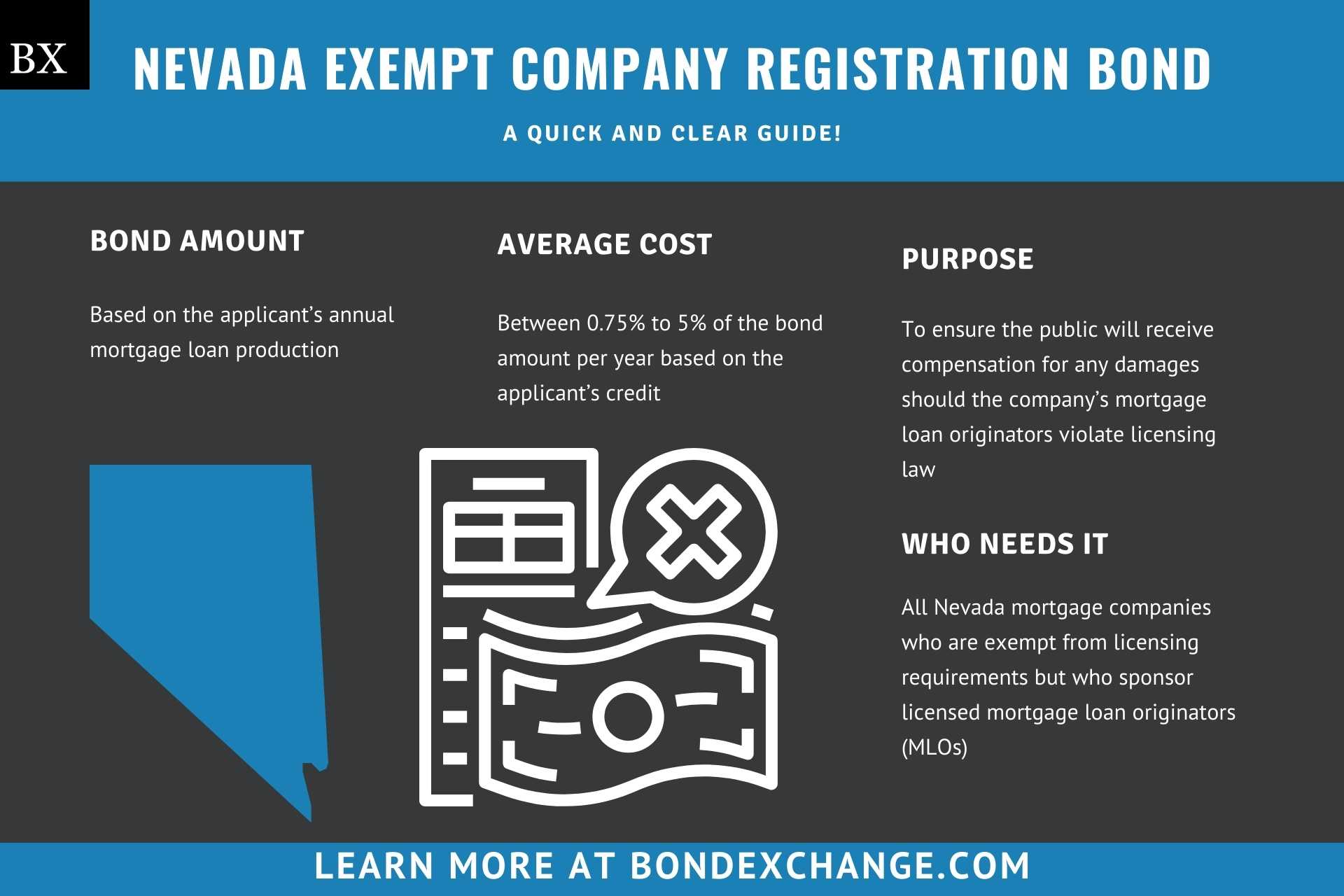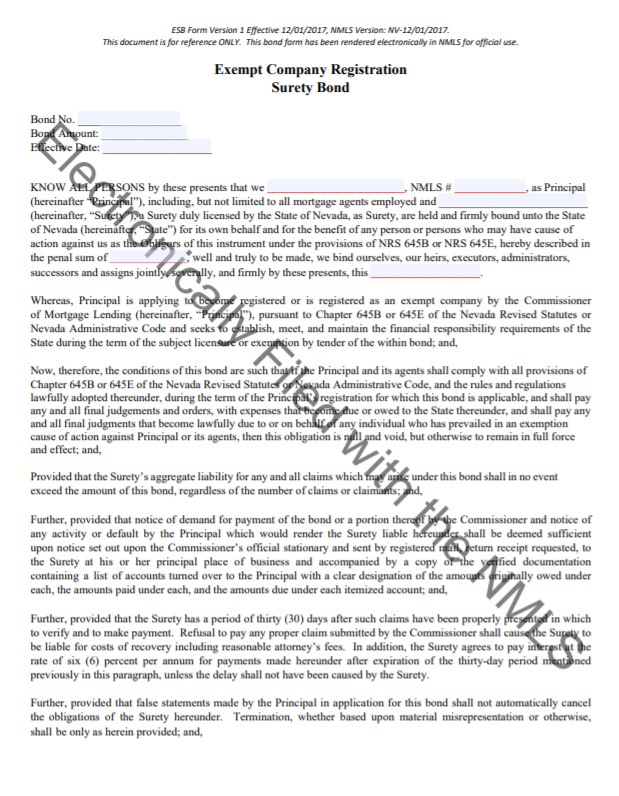Nevada Exempt Company Registration Bond: A Comprehensive Guide
August 2, 2021

This guide provides information for insurance agents to help their customers obtain Nevada Exempt Company Registration Bonds
At a Glance:
- Average Cost: Between 0.75% to 5% of the bond amount per year based on the applicant’s credit
- Bond Amount: Based on the applicant’s annual mortgage loan production
Table 1.1
| Annual Mortgage Loan Production | Bond Amount |
|---|---|
| $20 million or less | $50,000 |
| More than $20 million | $75,000 |
- Who Needs it: All Nevada mortgage companies who are exempt from licensing requirements but who sponsor licensed mortgage loan originators (MLOs)
- Purpose: To ensure the public will receive compensation for any damages should the company’s mortgage loan originators violate licensing law
- Who Regulates Exempt Mortgage Companies in Nevada: The Nevada Division of Mortgage Lending
Background
Nevada statute 645B.016 requires all mortgage companies who are exempt from licensure to register with the Division of Mortgage Lending. The Nevada legislature enacted the registration requirement and regulations to ensure that mortgage companies engage in ethical business practices. In order to provide financial security for the enforcement of the registration law, exempt mortgage companies who sponsor licensed mortgage loan originators must purchase and maintain a surety bond to be eligible for registration.
What is the Purpose of the Nevada Exempt Company Registration Bond?
Nevada requires mortgage companies who are exempt from licensure and who sponsor licensed MLOs to purchase a surety bond as part of the application process to obtain a business registration. The bond ensures that the public will receive compensation for financial harm if the mortgage company’s MLO employees fail to comply with the regulations set forth in Nevada statute 645B.042. Specifically, the bond protects the public in the event the company’s MLO employees engage in any acts of fraud or breach any contracts made with consumers. In short, the bond is a type of insurance that protects the public if the mortgage company’s MLO employees break licensing laws.

How Can an Insurance Agent Obtain a Nevada Exempt Company Registration Bond?
BondExchange makes obtaining a Nevada Exempt Company Registration Bond easy. Simply login to your account and use our keyword search to find the “exempt” bond in our database. Don’t have a login? Enroll now and let us help you satisfy your customers’ needs. Our friendly underwriting staff is available by phone (800) 438-1162, email or chat from 7:30 AM to 7:00 PM EST to assist you.
At BondExchange, our 40 years of experience, leading technology, and access to markets ensures that we have the knowledge and resources to provide your clients with fast and friendly service whether obtaining quotes or issuing bonds.
Is a Credit Check Required for the Nevada Exempt Company Registration Bond?
Surety companies will run a credit check on the owners of the mortgage company to determine eligibility and pricing for the Nevada Exempt Company Registration bond. Owners with excellent credit and work experience can expect to receive the best rates. Owners with poor credit may be declined by some surety companies or pay higher rates. The credit check is a “soft hit”, meaning that the credit check will not affect the owner’s credit.
How Much Does the Nevada Exempt Company Registration Bond Cost?
The Nevada Exempt Company Registration Bond can cost anywhere between 0.75% to 5% of the bond amount per year. Insurance companies determine the rate based on a number of factors including your customer’s credit score and experience. The chart below offers a quick reference for the approximate bond cost on both the $50,000 and $75,000 bond requirements.
$50,000 Exempt Company Registration Bond Cost
Table 1.2
| Credit Score | Bond Cost (1 year) |
|---|---|
| 700+ | $375 |
| 650 – 699 | $500 |
| 625 -649 | $625 |
| 600 – 624 | $750 |
| 550 – 599 | $2,000 |
| 500 – 549 | $2,500 |
$75,000 Exempt Company Registration Bond Cost
Table 1.3
| Credit Score | Bond Cost (1 year) |
|---|---|
| 700+ | $563 |
| 650 – 699 | $750 |
| 625 -649 | $938 |
| 600 – 624 | $1,125 |
| 550 – 599 | $3,000 |
| 500 – 549 | $3,750 |
Who is Exempt From Licensure?
The following individuals and entities are exempt from obtaining a mortgage company license, and instead must obtain an exempt company registration.
- Banks, savings banks, trust companies, savings and loan institutions, industrial loan companies, credit unions, thrift companies, insurance companies and all of their subsidiaries and holding companies
- Real estate investment trusts
- Employee benefit plans
- Licensed attorneys
- Licensed real estate brokers
- Anyone acting under a court order
- Individuals and married couples who provide money for investment in commercial loans secured by a lien on a real property or on his/her own account
- Individuals who strictly offer or negotiate the terms of a residential mortgage loan
- Government agencies
- Sellers of real property who offer credit secured by a mortgage of the property sold
- Nonprofits
- Housing counseling agencies
Do all Exempt Mortgage Companies Need to Purchase a Bond?
No, only exempt mortgage companies who sponsor licensed mortgage loan originators must purchase a surety bond. While exempt companies must employ at least one licensed MLO to obtain their registration, they are not required to purchase a surety bond if they require their MLO employee to obtain individual surety bond coverage.
How do Exempt Mortgage Companies Apply For a Registration in Nevada?
Exempt mortgage companies in Nevada must navigate several steps to secure their registration. Below are the general guidelines, but applicants should refer to the NMLS’s application guidelines for details on the process.
License Period – The Nevada Exempt Company Registration expires one year from the date of issuance and must be renewed before the expiration date
Step 1 – Purchase a Surety Bond
Exempt mortgage companies who sponsor licensed MLOs must purchase and maintain a surety bond (limits outlined in Table 1.1)
Step 2 – Hire A Qualifying Individual
Exempt companies must employ a qualified individual who is capable of supervising the company’s mortgage loan operations. The qualifying individual must be a licensed mortgage loan originator and is required to be in a management position relating to the company’s mortgage business.
Step 3 – Request an NMLS Account
The Nevada Exempt Company Registration application is submitted electronically through the Nationwide Multistate Licensing System (NMLS). To submit a license application, applicants must first request to obtain an NMLS account.
Step 4 – Complete the Application
All Nevada Exempt Company Registration applications can be completed online through the NMLS. Applicants must complete the entire application, and submit the following items:
-
- The reason the company is claiming exemption from licensure
- Certificate of Good Standing
- Letter from the applicant’s primary regulator indicating they are eligible to issue or broker mortgage loans
Exempt mortgage companies must pay a $300 fee when submitting their application.
How Do Nevada Exempt Mortgage Companies Renew Their Registration?
Exempt mortgage companies can renew their registration online through the NMLS. Registration holders need to simply login to their account to access their renewal application. The Nevada Exempt Company Registration expires one year from the date of issuance and must be renewed before the expiration date.
What Are the Insurance Requirements for the Nevada Exempt Company Registration?
Nevada does not require exempt mortgage companies to purchase any form of liability insurance as a prerequisite to obtaining a business registration, however, the company’s primary regulator may require them to do so. Exempt mortgage companies who sponsor licensed MLOs must purchase and maintain a surety bond (limits outlined in Table 1.1).
How Do Nevada Exempt Mortgage Companies File Their Bond?
Exempt mortgage companies should submit the completed bond form, including the power of attorney, electronically through the NMLS. The surety bond requires signatures from both the surety company that issues the bond and a representative from the mortgage company. The surety company should include the following information on the bond form:
- Name and NMLS number of entity/individual(s) buying the bond
- Surety company’s name
- Bond amount
- Date the bond goes into effect
- Date the bond is signed
What Can Nevada Exempt Mortgage Companies Do to Avoid Claims Against Their Bond?
To avoid claims on their bond, exempt mortgage companies in Nevada must ensure that their MLO employees follow all license regulations in the state, including some of the most important issues below that tend to cause claims:
- Do not engage in any acts of fraud
- Do not breach any contracts made with consumers
What Other Insurance Products Can Agents Offer Exempt Mortgage Companies in Nevada?
Nevada does not require exempt mortgage companies to purchase any form of liability insurance as a prerequisite to obtaining a business license. However, most reputable businesses will seek to obtain this insurance anyway. Bonds are our only business at BondExchange, so we do not issue liability insurance, but our agents often utilize brokers for this specific line of business. A list of brokers in this space can be found here.
How Can Insurance Agents Prospect for Nevada Exempt Mortgage Company Customers?
The NMLS conveniently provides a public database to search for active exempt mortgage companies in Nevada. The database can be accessed here. Contact BondExchange for additional marketing resources. Agents can also leverage our print-mail relationships for discounted mailing services.

